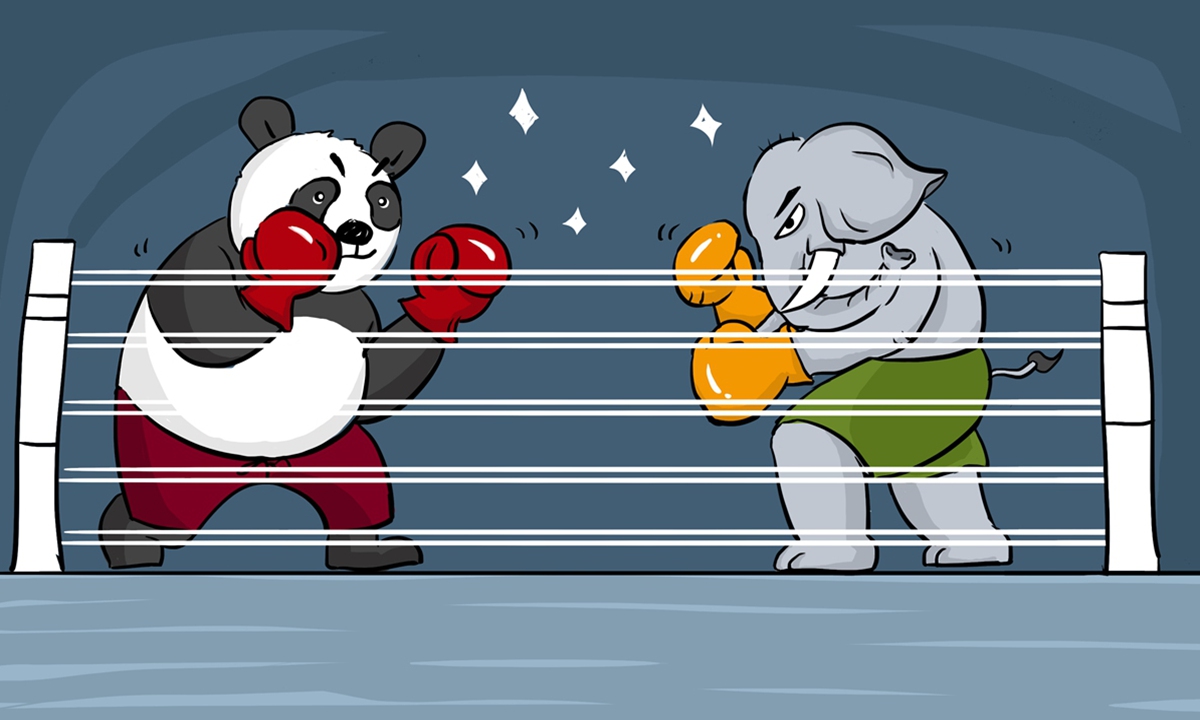Talks with India come with war preparedness: Global Times editorial
Source: Global Times Published: 2020/9/10 23:03:40

China India Photo: GT
Chinese State Councilor and Foreign Minister Wang Yi and Indian External Affairs Minister Subrahmanyam Jaishankar is scheduled to meet Thursday evening in Moscow amid tensions on the China-India border. The meeting, if happens, indicates that the two sides have maintained their political communication channels in the current critical situation, yet it is uncertain whether tensions will be eased by political will, given the two countries' huge differences on the Line of Actual Control (LAC), and Indian troops' aggressive attitude.
For some time, New Delhi has maintained flexibility in its diplomacy while its troops push ahead aggressively on border area. This seems to have become two strings to India's bow. Apparently, the Indian side is still severely misjudging the strategic situation with China, believing China does not wish for a conflict with India, while facing pressure from the US, and that India could force China to concede by nibbling into Chinese territory.
Whatever India says diplomatically, China should not only listen to its words, but also observe its actions. The Indian side does not accept the LAC of November 7, 1959, and is holding a grudge for its failure in the 1962 war. India's nationalist forces are in an unprecedented state of puffing. Chinese people shouldn't hope that a single negotiation could make India return to rationality. The Chinese side must be fully prepared to take military action when diplomatic engagement fails, and its frontline troops must be able to respond to emergencies, and be ready to fight at any time.
Facts have proven that Indian nationalist forces yield to coercion, but not to persuasion. They very much need another lesson in failure before believing that China's commitment to long-term border peace is not weakness. And they also need to know their own limitations. Provoking China, whose GDP is five times that of India and whose defense budget is two to three times that of the latter, is hitting a rock with an egg. We must let Indian nationalist forces thoroughly understand it.
The Chinese side demands Indian troops which illegally crossed the LAC to withdraw unconditionally. If India does not accept it, we would rather keep border tensions. The region where the confrontation takes place between the two militaries is of high altitude. It is difficult for both sides to maintain large-scale armies there. So, let's kick-start a show of strength and will.
If no war occurs, the two will compete on their logistics when winter comes. During the Galwan Valley brawl, 20 Indian soldiers died and most them were frozen to death after being injured. This shows Indian troops' poor logistics.
In high-altitude areas, India does not have the ability to make a large number of troops over the winter, which means many Indian soldiers will face the threat of freezing temperature and the uncontrollable epidemic. Indian troops' logistics are incomparable to that of the Chinese People's Liberation Army (PLA).
If Indian troops open fire at the PLA and provoke a war, the confrontation will become a quick battle. Whether India seized commanding heights on the southern bank of Pangong Tso Lake, or commissioned French Rafale fighter jets, they will be meaningless by then. The PLA will quickly deal a heavy blow to Indian troops, and they will be all annihilated.
China used to care too much about India's dignity. Such dignity has eventually been taken advantage by Indian nationalist forces. They have forgotten who they are. This time, everything should be put on the table. If India wants peace, China and India should uphold the LAC of November 7, 1959. If India wants war, China will oblige. Let's see which country can outlast the other.
India should take a good look at the world and at China. It should also look back at history. India has an abnormal confidence in confronting China. It does not have enough strength. If India is kidnapped by extreme nationalist forces and keeps following its radical China policy, it will pay a heavy price.
We hope China will proactively release more information about the actual situation on the border, just like the information released by the PLA Western Theater Command on Tuesday, making public that Indian troops fired shots at Chinese border patrol soldiers.
India is releasing information on the border region every day, and fabricating news about the PLA. China cannot let India control the narrative on the border situation. Once a war starts, the world's judgment on the war will largely depend on previous information and battle of public opinion is a prelude.
RELATED ARTICLES:
Posted in: EDITORIAL